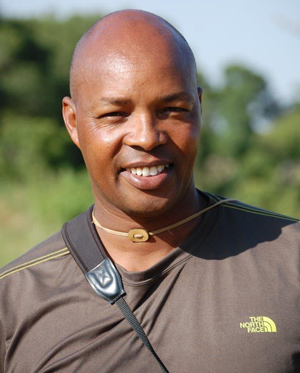A Maasai warrior, with one foot in a more modern world









Earlier this year, I returned home after two weeks on safari in the bush in Kenya. There I came to know a remarkable man whose life illustrates the conflict in the developing world between the solidity of ancient ways and the prospect of a prosperous future.
They call him “Kip.” His full name is Jonathan (his baptized, Christian name) Kip (his tribal name from his grandmother) Olole (“son of”) Polos (his family name). He is a Maasai, the most stubbornly self-conscious and aloof tribe in Kenya.
Maasai culture requires young men to become courageous warriors (“morans”) by undergoing circumcision without painkillers or tears at age 14. By killing a lion with a spear. By eating mostly cattle, blood and milk, never meat prepared by a woman. Historically the most warlike of all the tribes in Kenya, they still blame the colonial British for stealing their historic land nearly a century ago, especially the Maasai Mara National Reserve, the most beautiful and game-filled region of Kenya.
Kip was born in a small “manyatta,” a rural compound protected from predators by a thorn tree fence. The manyatta I visited included around 10 small huts made of woven sticks plastered with dried cow dung. Inside it was dark, hot and smoky, but intimate and oddly comforting. A small cooking fire burned in one room. In another, the family sleeps on cow skins laid on the dirt floor.
Kip has no idea of when he was born; there are no records available. He invented a birth date – October 10, 1972 – to satisfy various school forms. He never met his father, who “disappeared” – maybe nailed by the English authorities, maybe forced into the army – shortly after he was born.
He was raised by his mother … and by other families in the manyatta. Kip explains that that “it takes a whole village” to bring up a young Maasai, sounding oddly like a Kenyan Hillary Clinton.
As a little boy, Kip assumed the responsibilities his culture required. He herded first calves, then goats, then cows. His youthful tools were a little spear and a club. “You had to be willing to face anything to carry out your responsibility.” After killing the first predator that threatened his livestock, he said, “I became a man.”
A stubborn scholar
Following the dictates of Maasai culture, Kip’s grandfather, who loved him dearly, did everything in his power to keep him from going to school. But Kip was stubborn. He and three friends moved into an abandoned manyatta. Four days a week they attended school. Fridays they hunted for honey in the forest to sell in town markets a day’s walk away to earn school fees, then 10 Kenyan shillings.
For a time he attended high school, fees paid by an uncle and later by a generous Norwegian diplomat. He hoped to become a doctor. A pilot. Drive a car. Maybe even become a guide for tourists on safari. But the call of his tribal culture was strong.
So for six years he led the life of a Maasai warrior, living with other young men, all wearing skins and war paint, carrying shields, and dressing their long hair with red ochre and cow fat. “All I could think about was cattle, girls, fighting.” He killed an enormous Cape Buffalo, raided cattle from other settlements and tribes.
Then an epiphany: Kenya’s economic future depends in large part on conserving its wild animals, preserving its grasslands, developing its tourist assets. Kip sensed this, changed careers, started working for a conservation organization, attended Kenya Tourism College, eventually becoming manager of a tourist lodge.
He decided to shave off his long, long hair. Got married. Had three children, two boys now attending boarding school, and a daughter in day school. His wife is working on a degree in public health. He hopes his children will graduate from high school and take full part in the developing Kenya of the future.
But he also wants them to remain rooted in traditional Maasai culture. His boys will be circumcised, but by a surgeon. They will not eat meat prepared by a woman. But they won’t be traditional Maasai warriors; “not enough time for studies,” he explains.
Kip wants to qualify as a top-level safari guide. He dreams of starting his own safari company. “It’s tough to make a first-rate outfit,” he says, “but somebody’s got to do it.”
Kip spent two weeks with my family on safari in the bush. He was warm, funny, deeply knowledgeable about his country and its amazing wildlife. He loved my granddaughters, aged 10 and 8, and they loved him back. He called them his “little monkeys” as they ran to him in camp.
Kip is brave, stubborn, driven. He has one foot firmly planted in Maasai traditions. The other rests hard on the hopes of building a prosperous life in a developing country. Between them, a high fence of barbed wire.
Kip’s own safari, walking back and forth over that fence line, will tell us all a lot about the developing world – not just Kenya, but much of the globe – and what it will come to look like soon.
See what new members are saying about why they donated to Bridge Michigan:
- “In order for this information to be accurate and unbiased it must be underwritten by its readers, not by special interests.” - Larry S.
- “Not many other media sources report on the topics Bridge does.” - Susan B.
- “Your journalism is outstanding and rare these days.” - Mark S.
If you want to ensure the future of nonpartisan, nonprofit Michigan journalism, please become a member today. You, too, will be asked why you donated and maybe we'll feature your quote next time!


 Kip (photo by Kathy Power)
Kip (photo by Kathy Power)